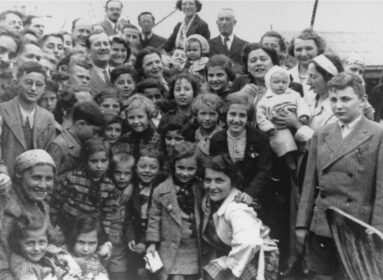
By Cindy Mindell
MIDDLETOWN – After 40 years of teaching at Wesleyan University, noted Chinese scholar and author Vera Schwarcz is retiring.
The Freeman Chair in East Asian Studies at the university, Schwarcz is a 1989 recipient of the Guggenheim Fellowship for her work in East Asian Studies. She has written eight books on Chinese and Jewish history, including Bridge Across Broken Time: Chinese and Jewish Cultural Memory, winner of the National Jewish Book Award; The Chinese Enlightenment: Intellectuals and the Legacy of the May Fourth Movement of 1919; Time for Telling Truth Is Running Out: Conversations with Zhang Shenfu; Place and Memory in Singing Crane Garden; and Colors of Veracity: A Quest for Truth in China and Beyond. She has also written five books of poetry.
Born and raised in Cluj, Romania, Schwarcz says that she has been “savoring a multi-lingual, multi-cultural world for many years.” At home, the family spoke Hungarian and her parents conversed in German. At school, she spoke Romanian and began studying Russian and French in 2nd grade. She learned and heard Yiddish and Hebrew throughout her childhood. Schwarcz was the child of a second marriage, born to parents who had each lost family during World War II.
“I grew up surrounded by survivors of the Shoah,” she says. “The presence of the past – one of the topics I write about – was literally all around me.”
The family left Communist Romania for the U.S. in 1962. Schwarcz became interested in China during her last semester at Vassar College, in 1969.
“It was the height of the anti-war movement and the ‘burden’ of Holocaust memory weighed heavily in my heart and mind,” she recalls. “I wanted to study something far from ‘home’ and I was drawn to all that seemed ‘progressive’ about the Chinese Revolution.”
Over the next four-and-a-half decades, Schwarcz says she would learn how murderous the Chinese Revolution really was. She also began to explore connections between her Jewish roots and Chinese culture. “Looking back, I became more deeply Jewish in the course of my Chinese studies,” she says.
After graduating from Vassar in 1969, Schwarcz entered a Master’s program in Chinese history at Yale, drawn to the complexity and beauty of Chinese calligraphy. She went on to complete a PhD in Chinese history at Stanford. With China closed to foreign scholars, she studied in Taiwan and Hong Kong, “gazing at the mainland from afar,” she says.
Schwarcz began teaching Chinese history at Wesleyan in 1975, where she would create the East Asian Studies Program. She made a brief visit to China in 1977 and returned there in 1979 for 18 months, the only PhD selected for the first-ever group of American exchange scholars studying social science and humanities. After managing to escape the holding pen for foreigners at the Beijing Foreign Languages Institute, Schwarcz visited the elite Peking University, where she interviewed several survivors of the Cultural Revolution.
“It was a sobering, inspiring, and jolting experience,” she says. “Out went all the theories that I had been infatuated with in graduate school. I began to truly listen to the voices of history. All my books evolved out of those formative encounters.”
After returning to the U.S., Schwarcz eventually married Wesleyan professor of biology Jason Wolfe z”l. The couple moved to West Hartford in 1991 after a sabbatical year on a kibbutz. The parents of three children – Gavi, Elie and Esther – the family became involved in life at the Bess & Paul Sigel Hebrew Academy in Bloomfield and the Young Israel of West Hartford. Today, Schwarcz remains active in both institutions.
“Vera is a pillar of the Young Israel community,” says Rabbi Brahm Weinberg, the congregation’s spiritual leader. “She touches so many lives through her informal teaching, her work with the children of our community, and through all the chessed (acts of kindness) she does in her own quiet and unassuming way. Vera is an exemplar of commitment and sincerity that any rabbi would love to find in a congregant. Vera is, rightfully, a person whom members of our synagogue look up to with great respect and admiration for who she is as a scholar, but even more so, for who she is as a person.”
For Schwarcz, involvement in Jewish life is not an option. It is an imperative.
“In Communist Romania, Jewish life was an open secret, and Chief Rabbi Mosez Rosen managed to save most Jewish institutions by collaborating with the Party,” Schwarcz says. “Growing up, we went to synagogue a few times a year, and my aunt died in a kosher retirement home. Once we moved to West Hartford with our young children, I felt it was important to get involved and model for them the meaning of Jewish communal responsibility – kol Yisrael arevim zeh l’zeh – all Jewish fates are inter-tangled.”
Over the years, Schwarcz has headed the Hebrew Academy Jewish Studies Committee, become deeply involved with Mikveh Bess Israel, and chaired the Mandell JCC Holocaust Commemoration Committee. With the recent death of her husband, she has scaled back her public involvement, but still volunteers at Hebrew Academy in one-on-one learning with students.
“Leaving Wesleyan after 40 years is an opportunity to consolidate and build a legacy as well,” she says. “I know that the truly excellent East Asian Studies Program that I have built will endure and grow. My greatest concern now is to build a more solid foundation for Jewish life among the students.”
To that end, Schwarcz actively supports Chabad at Wesleyan, directed over the last three years by Rabbi Levi and Chanie Schectman, an important presence on a campus that can be “fiercely anti-Israel and anti-religion,” according to the veteran educator.
“Truly liberal education, I believe, requires a socially- and spiritually-anchored mind,” Schwarcz says. “Chabad at Wesleyan nurtures this in a most meaningful fashion. In an academic context in which family values are rarely articulated or affirmed, they demonstrated the concrete joys and responsibilities of a Jewish family environment. The Schectmans’ Shabbat table, as well as their weekly classes, challah-baking, and events for Chagim have opened an important new space where it is possible to affirm pro-Israel positions without being ostracized as a ‘narrow-minded conservative.’ Around them, it is possible to redefine the meaning of critical thought so as to include ethical and religious perspectives as well. After travelling to many campuses across the U.S. and abroad, I have come to see that Chabad is the most meaningful framework to strengthen and deepen Jewish life for students in a supportive, non-judgmental fashion.”
Rabbi Schectman agrees.
“Vera is passionate about Jewish life at Wesleyan and helped us in any way she could,” he says. “She has been a tireless advocate for the advancement of how critical thinking and Judaism are not mutually exclusive but, quite the contrary, they can lead to deeper understanding and appreciation. I have had many conversations with her discussing this and it has greatly helped our approach here. She has always given of herself and has been 100% there for us. We consider her a co-founder in a sense. She really invested herself in her students, showing concern for how they were doing as people and not just as students.”
To honor Schwarcz, Chabad is hosting an event in New York City Wednesday, May 20, at which the newly retired professor will be keynote speaker. Though the evening is an opportunity for students and colleagues to show their appreciation for Schwarcz’ contribution to academia and Jewish life at Wesleyan, she demurs, saying, “My real reward has been the privilege of teaching outstanding students for four decades.”
After retirement, Schwarcz plans to spend more time in Israel and with her children and five grandchildren. She will be learning this summer at the Nishmat center for women’s Torah study in Jerusalem. She intends to work with Holocaust survivors who found refuge in Shanghai, to help them write their memoirs from World War II.
She also hopes to continue her writing life, working on essays about witnessing the Shoah and remembering the Tiananmen Square massacre of 1989, and on a volume of poems in memory of her husband. She may even take Martin Buber to China, via a philosophical novel. “Buber was deeply interested in Daoism but never went East, beyond Israel,” she says. “I want to take him to Asia and create a conversation with the Chinese intellectuals of the 1920s and 1930s who had been the subject of my previous books. Perhaps by envisaging such conversation, I can inch us forward toward a world of mutual cultural understanding. This, in turn, may help to heal the historical wounds that still haunt Chinese and Jews in the 21st century.”
For more information on the May 20 event honoring Dr. Vera Schwarcz, visit chabadwesleyan.org/vera.
CAP: Dr. Vera Schwarcz spoke about “The Human Dot on Yellow Mountain: Re-thinking 45 Years of China Study,” when she delivered the 40th Annual Mansfield Freeman Lecture at Wesleyan University on April 16. Photo credit: Dat Vu ’15.









 Southern New England Jewish Ledger
Southern New England Jewish Ledger















